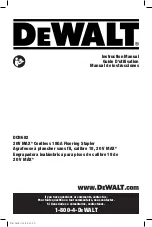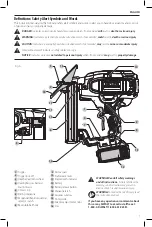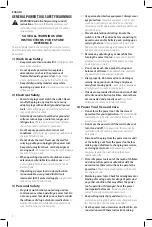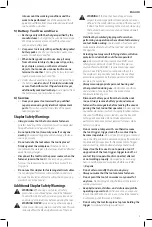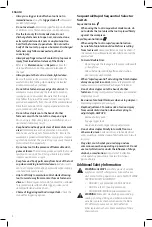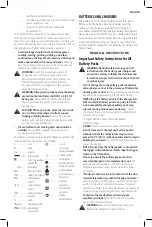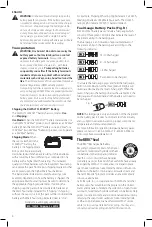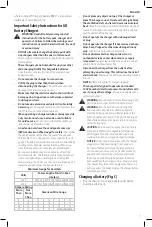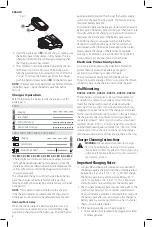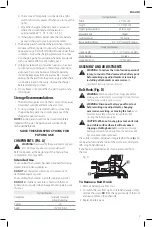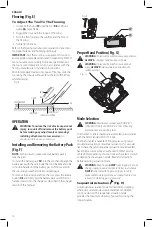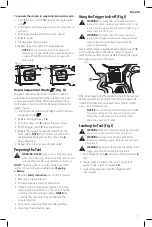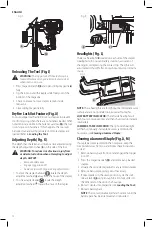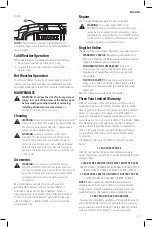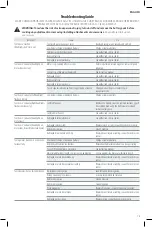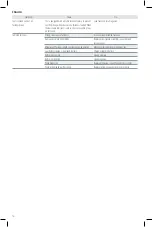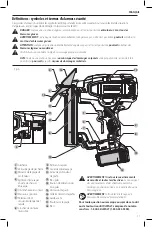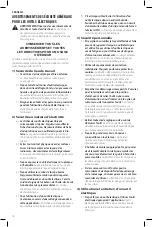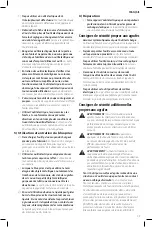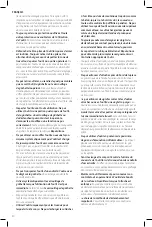
English
5
• lead from lead-based paints,
• crystalline silica from bricks and cement and other
masonry products, and
• arsenic and chromium from chemically-
treated lumber.
Your risk from these exposures varies, depending on how
often you do this type of work. To reduce your exposure to
these chemicals: work in a well ventilated area, and work with
approved safety equipment, such as those dust masks that are
specially designed to filter out microscopic particles.
•
Avoid prolonged contact with dust from power
sanding, sawing, grinding, drilling, and other
construction activities. Wear protective clothing and
wash exposed areas with soap and water.
Allowing
dust to get into your mouth, eyes, or lay on the skin may
promote absorption of harmful chemicals.
WARNING:
Use of this tool can generate and/
or disperse dust, which may cause serious and
permanent respiratory or other injury. Always use
NIOSH/OSHA approved respiratory protection
appropriate for the dust exposure. Direct particles
away from face and body.
WARNING: Always wear proper personal hearing
protection that conforms to ANSI S12.6 (S3.19)
during use.
Under some conditions and duration
of use, noise from this product may contribute to
hearing loss.
CAUTION: When not in use, place tool on its side
on a stable surface where it will not cause a
tripping or falling hazard.
Some tools with large
battery packs will stand upright on the battery pack
but may be easily knocked over.
•
Air vents often cover moving parts and should be
avoided.
Loose clothes, jewelry or long hair can be
caught in moving parts.
The label on your tool may include the following symbols. The
symbols and their definitions are as follows:
V ......................... volts
Hz .......................hertz
min .....................minutes
or DC ......direct current
...................... Class I Construction
(grounded)
…/min ..............per minute
BPM ....................beats per minute
IPM .....................impacts per minute
RPM .................... revolutions per
minute
sfpm ................... surface feet per
minute
SPM ....................strokes per minute
A .........................amperes
W ........................watts
or AC ...........alternating current
or AC/DC .... alternating or
direct current
...................... Class II
Construction
(double insulated)
no .......................no load speed
n .........................rated speed
......................earthing terminal
.....................safety alert symbol
.....................visible radiation
..................... wear respiratory
protection
..................... wear eye
protection
..................... wear hearing
protection
..................... read all
documentation
BATTERIES AND CHARGERS
The battery pack is not fully charged out of the carton.
Before using the battery pack and charger, read the
safety instructions below and then follow charging
procedures outlined. When ordering replacement battery
packs, be sure to include the catalog number and voltage.
Your tool uses a
D
e
WALT
charger. Be sure to read all safety
instructions before using your charger. Consult the chart
at the end of this manual for compatibility of chargers and
battery packs.
READ ALL INSTRUCTIONS
Important Safety Instructions for All
Battery Packs
WARNING: Read all safety warnings and all
instructions for the battery pack, charger and
power tool. Failure to follow the warnings and
instructions may result in electric shock, fire and/
or serious injury.
•
Do not charge or use the battery pack in explosive
atmospheres, such as in the presence of flammable
liquids, gases or dust.
Inserting or removing the battery
pack from the charger may ignite the dust or fumes.
•
NEVER force the battery pack into the charger. DO
NOT modify the battery pack in any way to fit into
a non-compatible charger as battery pack may
rupture causing serious personal injury.
Consult
the chart at the end of this manual for compatibility of
batteries and chargers.
• Charge the battery packs only in designated
D
e
WALT
chargers.
•
DO NOT
splash or immerse in water or other liquids.
•
Do not store or use the tool and battery pack in
locations where the temperature may reach or
exceed 104 °F (40 °C) (such as outside sheds or metal
buildings in summer).
For best life store battery packs in
a cool, dry location.
NOTE: Do not store the battery packs in a tool with
the trigger switch locked on. Never tape the trigger
switch in the ON position.
•
Do not incinerate the battery pack even if it is
severely damaged or is completely worn out.
The
battery pack can explode in a fire. Toxic fumes and
materials are created when lithium ion battery packs
are burned.
•
If battery contents come into contact with the skin,
immediately wash area with mild soap and water.
If
battery liquid gets into the eye, rinse water over the open
eye for 15 minutes or until irritation ceases. If medical
attention is needed, the battery electrolyte is composed of
a mixture of liquid organic carbonates and lithium salts.
•
Contents of opened battery cells may cause
respiratory irritation.
Provide fresh air. If symptoms
persist, seek medical attention.
WARNING:
Burn hazard. Battery liquid may be
flammable if exposed to spark or flame.
Summary of Contents for DCN682M1
Page 54: ...Español 52 ...
Page 55: ...Español 53 ...

